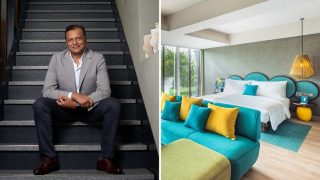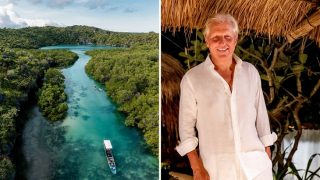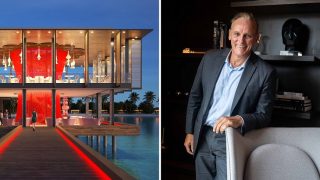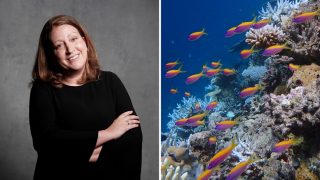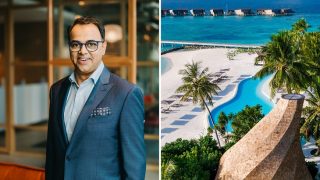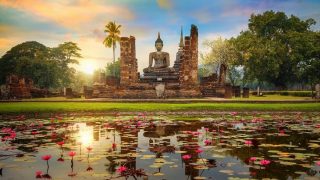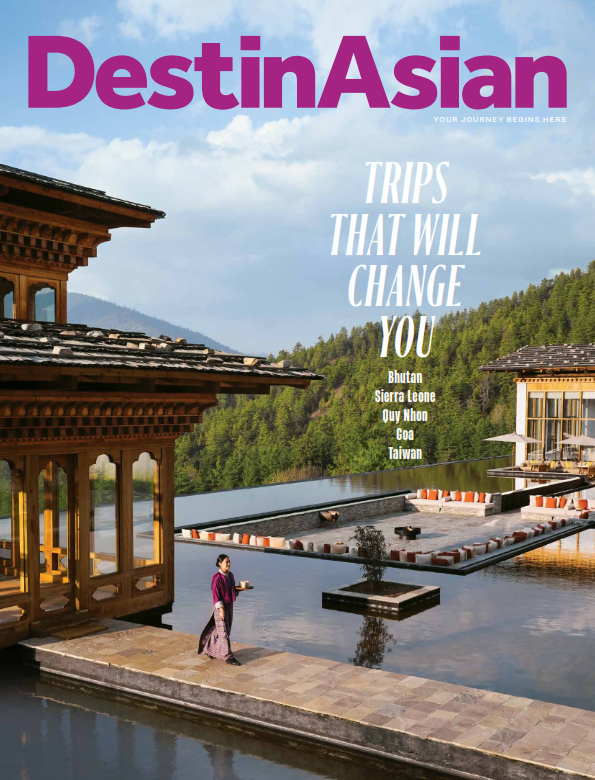The general manager of one of southern Thailand’s top hotels—and the first five-star property on the island of Koh Lanta when it opened in 2001—shares why he’s optimistic about its future.
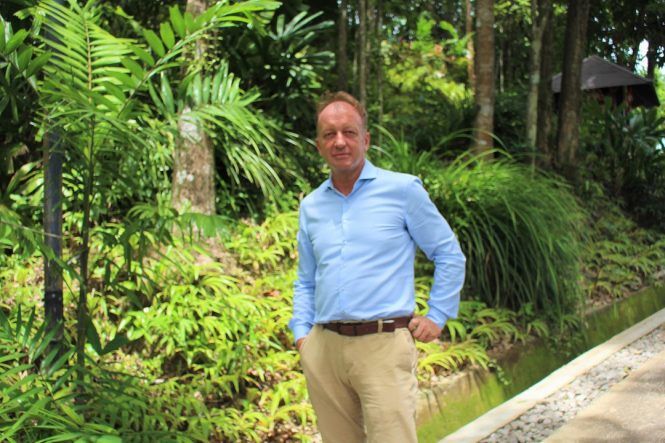
Patrice Landrein, Pimalai’s general manager. (Photo: Pimalai Resort & Spa)
With Thailand currently shut to foreign visitors, what has the team at Pimalai been up to?
Koh Lanta’s closure has given us about two months to re-engineer the way we used to operate. We had to rethink everything from the way we cleaned our guest rooms to how we could improve our services to guests. Staff training has increased in all departments with regular English classes, folk-design tutorials for unique decorations across the resort, and music lessons to keep spirits high. Despite the temporary closure of the island, our resort continues to provide three meals a day for staff.
A full deep-cleaning and maintenance program is in progress across all 300 rai [about 48 hectares] of the resort, including accommodation, public areas, restaurants, the spa, and gardens. Alternative energy programs, composting, and organic farming initiatives are all in full swing.
Before Covid-19, we had planned to renovate only 10 villas this year because of the lack of time and workers. But now we have enough time and resources to renovate 20 hillside ocean-view villas with private pools. The new interiors by Thailand’s P49 Deesign are bright and modern, inspired by marine colours, contours, and movement. The resort is also conceptualizing the first wedding chapel on the island with appointed designers Habita, whose work includes projects for Six Senses and Soneva.
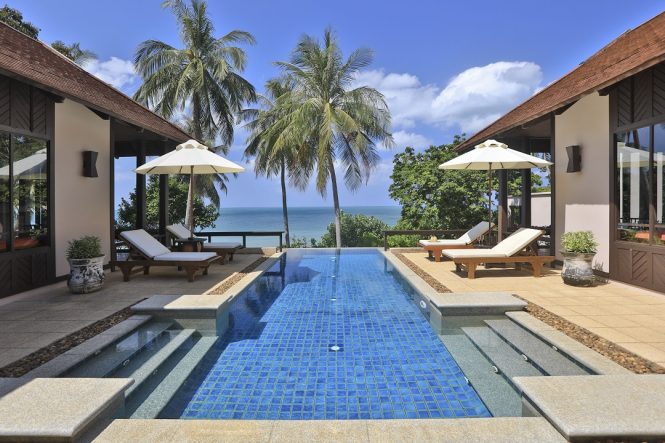
The private pool at a beachside two-bedroom villa. (Photo: Pimalai Resort & Spa)
So many hotels have had to lay off staff members or put people on unpaid leave. How is your resort coping with this unprecedented situation?
The vision of Pimalai has always been far-sighted. It is for this reason we do not panic, but think carefully, taking care of our people and consider the future. When we first opened a lot of people thought we were a little mad to be honest given the former remoteness of Koh Lanta. But look how the world has changed. We came here to create a private, service-driven, nature-inspired experience. This is now more relevant than ever before—and we will continue to move forward with our philosophy and prepare for guests when they travel again.
Currently, we are still supporting all our staff with some pay. We cannot afford to pay their full salaries, but at least we are trying to help them survive this situation. And if we bring some business back, we will be able to help local people too. We will buy fresh seafood from Koh Lanta’s fishermen, procure fruits and vegetables from farmers, and use the services of local tour guides.
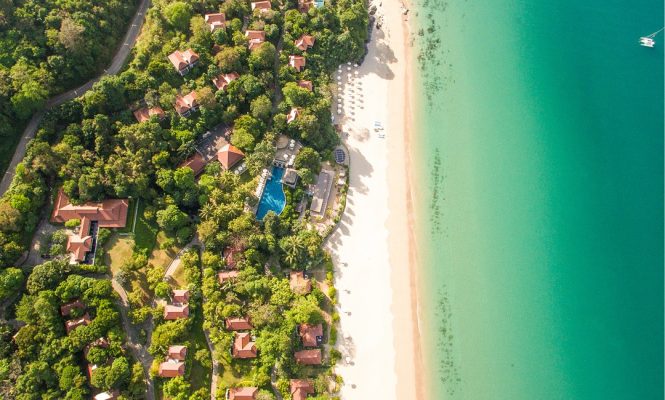
An aerial view of Pimalai’s beach-facing villas and Kantiang Bay. (Photo: Pimalai Resort & Spa)
In your opinion, which consumers and markets will lead the recovery of the travel and tourism sector?
Asians and Australians should be traveling again in the third quarter, and Europe and America will be back in the fourth quarter at the earliest and when it starts to get cold in their home countries. Thais should be traveling all year round. The lockdowns have left people with more desire to travel than ever, so we are quite optimistic and expecting to see quite high occupancy in the third and fourth quarters. We will have to come out with packages that match each market and attract them to stay a little longer.
Apart from the renovated villas, what else can travelers expect to see when they return to Pimalai?
Alcohol gel and masks have become items that our hotel orders on a regular basis. Staff will be wearing masks until the outbreak is over, but after that, we will still leave hand sanitizer and masks as standard amenities in rooms and public areas. We will also appoint a responsible person to inspect and check the cleanliness of each guest room. Of course, social distancing at Pimalai will have to continue. Each table at our restaurants and the sun loungers by the pool and on the beach are now positioned at least two meters apart. Fortunately, we have plenty of space to do that.
People will be looking to travel to uncrowded destinations with space between each room. Our resort’s rooms and villas are spread across 48 hectares of land, and there are only 121 units in total; our beach is 900 meters long. So, we are lucky that our property matches the new travel trend.
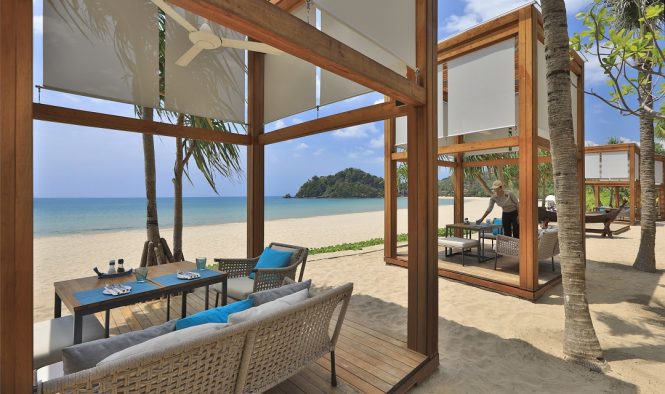
Cabanas at Rak Talay restaurant are perfect for social distancing. (Photo: Pimalai Resort & Spa)

